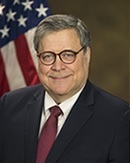Attorney General of the United States William Barr gave prepared remarks at a press conference today. He attributed the violence to extreme left-wing agitators:
“Unfortunately, w/ the rioting that is occurring in many of our cities around the country, the voices of peace protest are being hijacked by violent radical elements.”
He continued that:
“Groups of outside radicala and agitators are exploiting the situation to pursue their own separate and violent agenda.”
And here came his main point:
“In many places, it appears the violence is planned, organized, and driven by anarchic, far left extremist groups using Antifa-like tactics.”
Of course, "appears" is a great weasel word. Barr said “ant-EE-fuh.” “Antifa” stands for anti-fascist, and going against fascism seems patriotic. Fascists have had a bad reputation ever since World War II. But “ant-EE-fuh?” By pronouncing it that way, instead of “anti-faa,” which is more etymological, Barr blurred the group’s anti-fascist message, making Antifa sound foreign and disloyal. Does that reflect his ideology? Did he mispronounce the word to downplay the anti-fascist symbolism?
More important, he asserted, with the authority of the Department of Justice, that left-wingers are driving the protest against police violence. Does he have evidence for that? Or is it just an assumption? I worry a bit, since this sounds very much like the right-wing rhetoric that I heard as a child during the Joseph McCarthy era.
But Minnesota’s Governor Tim Walz, who has been supervising law enforcement in some of the most violent demonstrations in Minneapolis, took a more measured, and surprising, tone. Like Barr, Walz condemned the violence, saying that the rioters were “attacking civil society (and) instilling fear and disrupting our great cities.” Minnesota officials said, as did Barr, that some of the people being arrested were white supremacists who had come to the community to agitate. According to Jon Parton of Courthouse News, “Department of Safety Commissioner John Harrington said they are contact-tracing the arrested and added that an investigation is underway about white nationalist groups posting online to encourage their members to use the protests as a cover to create chaos.”
White nationalists? Or Antifa terrorists? The extreme left wing, or the extreme right wing? Or both?
Who is right? I’m sure that federal, state, local law enforcement will investigate the riots thoroughly. I’m equally sure the partisan media outlets will spin the facts to suit their predetermined opinion. On today, the actual day of the event, the local officials might know more about on-the-ground events than the Attorney General in Washington. But who knows for sure? Barr, who is noted for conservative views, echoed terminology that is typical of the right-wing blogosphere: "outside agitators," "anarchic, far-left extremist groups," and so on. Was he responding that way because his ideology told him to blame left-wingers? Or did he possess facts that he has not yet mentioned? And, of course, it is possible, although perhaps less likely, that Minnesota officials blame white supremacists to divert attention from their own citizens.
We all tend to believe what we want to believe. Psychologists call this motivated reasoning. We all see the world through ideological lenses. Rhetorical theorist Kenneth Burke said that we understand the world through a “terministic screen” that uses words to shape our perceptions. The German philosopher Ernst Cassirer explained that our language structure shapes how we deal with reality. And I vaguely remember that the great conservative radio announcer Paul Harvey was once accused of reading the news with “complete and total bias.” Harvey responded that he felt sorry for people who thought they could be objective. He had a good point.
At the same time, does not wisdom require us to see beyond our immediate, narrow focus? Can we truly not try to see other people’s perspectives, to accept that our ideology might be wrong? Hamlet wisely told Horatio:
There are more things in heaven and earth, Horatio,
Than are dreamt of in our philosophy. (Hamlet, Act 1, Scene 5)
And so it is with us. We want to believe that our side is right while the other side is wrong. We fill in our knowledge blanks by letting ideology tell us what is true. Unless we can
shake loose of our preconceptions, and see the world more as it is and less as we want it to
be, how will we ever understand one another? Or, to put it
another way, if we leave our truth behind in favor of comfortable, ideological
falsehoods, why would we even deserve to have hope for the future?
I have seen too many times in the last several years that people believe things that fit their ideology, while stubbornly refusing to accept any facts that contradict their predetermined framework. I suspect that that is what William Barr was doing as he intoned tired right-wing terminology. However, consistent with the philosophy that I explained above, I don’t want to jump to conclusions. Maybe the truth is somewhere in the middle. Is that not sometimes the case? Maybe, when all the facts come out, we will see a different picture entirely from what anyone today believes amidst an ongoing disaster.
So, yes, I think we are all ideological, all the time. But I get
very worried when people like Barr spout off typical ideological buzzwords. I
also think that ideology can quickly destroy rational thought. Watch out for
ideology: it’s loaded.
Department of Justice photo

No comments:
Post a Comment